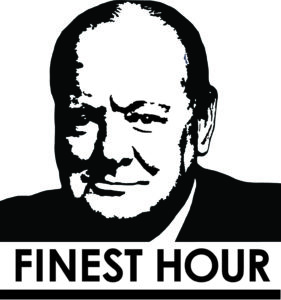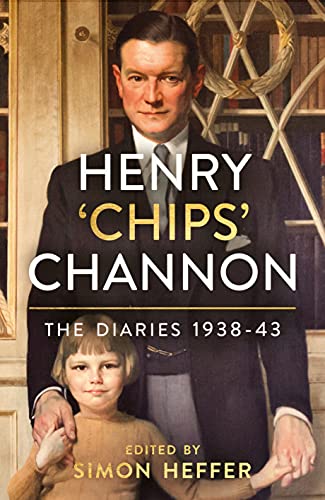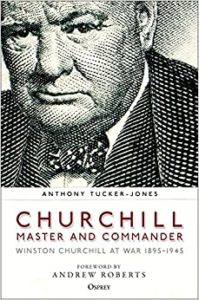
Finest Hour 195
Books, Arts, & Curiosities – An Angry Bull-frog

November 14, 2022
Finest Hour 195, First Quarter 2022
Page 47
Review by Philip Williamson
Philip Williamson is Emeritus Professor of History at Durham University and author of Stanley Baldwin: Conservative Leadership and National Values (1999).
Simon Heffer, ed., Henry “Chips” Channon, The Diaries: 1938–43, Hutchinson, 2021, 1,097 pages, £35.
ISBN 978–1786331823
This is the second volume of the complete edition of the enormous diaries of Henry “Chips” Channon, the wealthy American expatriate who became a British Conservative MP in 1935. This volume reaches from the immediate aftermath of the Munich agreement in October 1938, through the start of the Second World War in September 1939, the replacement of Neville Chamberlain by Winston Churchill in May 1940, the outbreak of war against Japan and establishment of the American alliance in December 1941, to the fall of Mussolini in July 1943. Until a reconstruction of the government in July 1941, Channon was parliamentary private secretary to the under-secretary at the Foreign Office, R. A. Butler. Channon was not a member of the government, but an unpaid aide to a junior minister; even so, he had some inside knowledge of policy and political discussions in a central department of state.
After reverting to being a backbencher, Channon continued to record great set piece parliamentary occasions and behind-the-scenes political gossip and intrigues. The most consistent elements of his diaries, however, remained his part in London high society, which expanded still further after his association with the Foreign Office ended. With expensive lunch and dinner parties continuing largely unabated throughout the Blitz, Channon continued to cultivate his friendships with members of various royal families, now mostly east European and in exile, and to pursue his lavishly-financed and complex personal life. Many passages deal with his Belgravia house and Essex estate; with the disintegration of his marriage and protracted divorce negotiations; with his love and longing for his son (sent to the USA to avoid the bombing raids); with his long-distance affair with his new partner, Peter Coats, a gardening writer turned aide to General Wavell in the Middle East and India; and with his homoerotic passions for numerous other men.

2025 International Churchill Conference
In all these matters, Channon remains an entertaining commentator and even, despite his own testimonies to the contrary, an engaging character. The quality of his observations and prose easily sustains the reader’s interest through more than a thousand pages. The editor, Simon Heffer, provides well-judged explanatory notes, helpful yet restrained, and—with such a huge cast of individuals—the index is appropriately excellent. Much of the new material, not included in Robert Rhodes James’s selected edition of 1967, is on the personalities and lifestyles of Channon’s social milieu, and perhaps more particularly his brand of wickedness in high places, with its infidelities and promiscuities: the diaries will increase the count of known bisexual or homosexual MPs and government ministers. There are fewer revelations for historians of politics and the war, but they too will find ample additional details that will nuance understandings of the end of appeasement, the continuing afterlife of appeasement opinion, and the uneasy positions of the Chamberlain and Churchill coalition governments during the early wartime years.
Channon was besotted with Neville Chamberlain. In January 1939, he admitted that he was “quite schoolgirlish” in his “hysterical, almost fanatical worship” of the prime minister. Even this understates his ardour for “the greatest man of all time,” “the most miraculous human alive,” “a saint,” and “our amazing little god.” This precluded all sympathy towards those with reservations towards the principal causes of Channon’s devotion: conciliation of fascist Italy and Nazi Germany, avoidance of war, and then, into the autumn of 1940, the hope of a negotiated peace. His venom was directed chiefly towards Anthony Eden and Duff Cooper, who committed the offence of resigning from Chamberlain’s cabinet during 1938, and the “Edenites” or “Glamour boys”—“drenched in stupidity, tinged with sedition”— who joined them in criticising appeasement and who, in Channon’s interpretation, positively wanted war with Germany.
Winston Churchill is less prominent in the diaries than one might expect, in part because he was not part of Channon’s social world, but mainly because Channon was determined to underestimate him. In October 1938, he is described as “an angry bull-frog, slave of a prejudice” (meaning suspicion of Nazi Germany), and after he reentered the cabinet in September 1939 as “fat wicked old Winston,” “the old ruffian,” “the man who has never been right” (although Channon’s greater hatred—he uses the word himself—was directed, on personal grounds, on Churchill’s son, Randolph). Channon was usually unimpressed by Churchill’s parliamentary speeches and broadcasts, even the now famous series as prime minister during the summer of 1940.
Channon’s critical opinion of Churchill should not be discounted entirely: as Richard Toye has shown, contemporary political and public reactions to the prime minister’s eloquence varied considerably. Nor should Channon’s frequent criticisms of Churchill, reports of wider political dissatisfaction with his leadership, and descriptions of his coalition cabinet as “this shabby government” and “a ramp and a racket” be dismissed as merely the resentment of the disappointed. As numerous historians have shown, an undercurrent of Conservative scepticism towards Churchill persisted throughout the war, and well into 1943 there were plenty of military and naval setbacks to raise legitimate doubts about the conduct of war and diplomacy—doubts which Churchill himself sometimes shared, reacting with changes of policy, ministers, and commanders. Channon’s diaries provide a useful counterpoint to the established Churchillian account of the war.
Even so, there are ample reasons to be cautious. As reviewers of the Rhodes James selection and the first volume of this new edition have commented, the interest, sharpness, and sheer entertainment of Channon’s diaries can make it easy to forgive some of his more remarkable opinions—too easy. It is entirely correct that the diaries are now published in full, with only slight omission of repetitive material and a very occasional redaction of racist terms. In an editorial foreword, his grandchildren ascribe what are now rightly considered to be offensive language and opinions to the attitudes of the time in which they were written; but Heffer observes, more accurately, that they would even have been “distasteful to many when he wrote them.” Despite his profuse friendships and acquaintances, Channon was familiar with only a particular fraction of London high society and the British political world.
Nor would Channon’s verdicts on the great issues have been widely shared, even by fellow appeasers. Few reduced Kristallnacht and the German occupation of Prague to instances of Hitler being unhelpful towards Chamberlain. Nancy Mitford reported that at a glittering London society event after the war, Channon was heard to remark of the participants that “this is what we have been fighting for,” to which his fellow socialite Lady Cunard had the wit (and some integrity) to observe “why, are they all Poles?”
Subscribe
WANT MORE?
Get the Churchill Bulletin delivered to your inbox once a month.





